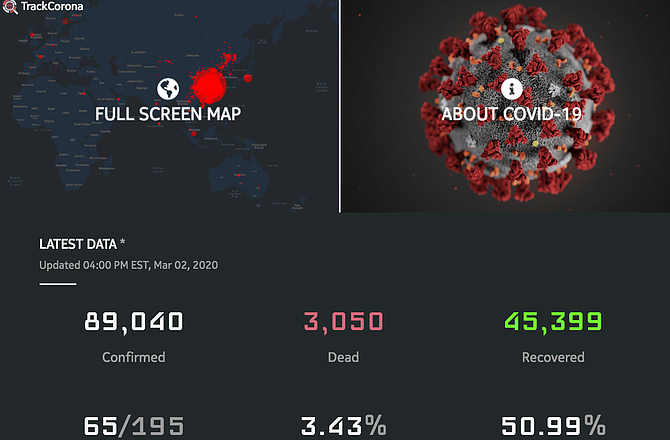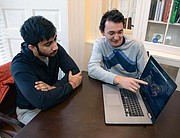It all started with a school-wide email alert that students Soukarya Ghosh and James Yun received from the University of Virginia’s administration: the 2019 coronavirus (COVID-19) hadn’t yet claimed any American lives, but, there were no guarantees — or any cure in sight for this severe respiratory tract disease.
“We realized we knew almost nothing about this global epidemic, so we seized the opportunity and decided to start working on an informative platform that is as accurate as possible and accessible to everyone,” Ghosh, a third-year student at UVA, said. “This is a human-to-human transmitted virus, so it would be ideal if the public are informed about the tendencies of the virus, as well as the urgency of it. Being able to have a centralized hub where they can find all the information about the virus, as well as be able to visualize the data in intuitive ways, helps with this.”
So Ghosh and Yun, both Yorktown High School alums and current Computer Science majors, got to work on an online live coronavirus tracker – TrackCorona (www.trackcorona.live). Having launched in early February, TrackCorona is not only one of the first virtual tools of its kind, but it is also one that gives a comprehensive view of COVID-19.
“Our main purpose is to inform people correctly, and for there to be a central hub to populate information with reliable and verified sources,” Ghosh explained. “We came across a lot of misinformation about the state of COVID-19, so we want people to have a central source to get correct information. We also want to differentiate ourselves in being more than just a dashboard of uncontextualized numbers. Instead, people need to understand what the numbers mean with respect to past outbreaks.”
Currently, when visitors pull up TrackCorona, they immediately see a dashboard that shows all the pertinent information about COVID-19 cases worldwide: the number of occurrences, deaths, and recoveries. The information, updated hourly, is broken down in a few ways, too – with a worldwide map, as well as numbers as percentages, by country, and through charts and graphs.
Less than five minutes on the site, and you’ll clearly see that there have been nearly 90,000 confirmed cases (as of Monday, March 2) among 54 (out of 195) countries. Those affected have overwhelmingly been in China – accounting for more than 97 percent of confirmed cases – where this coronavirus was first identified. Of the more than 2,800 lives claimed by COVID-19, nearly 99 percent have also been in China.
In addition to these fast facts, the site also provides overarching information about the coronavirus alongside summaries of symptoms, tips for avoiding contraction, and updates about ongoing treatment and research.
“Many people don’t have the time to read through all the latest reports, so we prioritize displaying this information in digestible chunks perfect for a quick read,” said Yun, a fourth-year UVA student set to graduate this spring. “At a glance, users can assess their risk of exposure to the virus in their area and abroad, especially important for those who travel overseas. Spending a little more time on the site, users can read up on a curated list of notable events in the virus’ history and even quiz themselves on some of the common misconceptions about COVID-19. We aim for TrackCorona to be the information hub for COVID-19, providing a wide range of insightful visualizations and statistics on a single site.”
As to whether knowledge is power or a recipe for mass hysteria, Ghosh and Yun insist that this constantly updating information is empowering — so long as it’s unequivocally accurate.
“With the coronavirus having big numbers, like more than 80,000 confirmed cases and more than one thousand deaths, we wanted to diminish hysteria and present pertinent information through smart data analysis,” Ghosh said. “We do not want the public to be unnecessarily alarmed. ...However, we want people to acknowledge the threat it may pose in the near future and be sufficiently prepared for it. Our goal is to raise awareness and be as informative as possible, without causing mass hysteria, so people can be smarter about hygiene and daily tasks.”
As they got the ball rolling, Ghosh and Yun quickly realized that they needed more brain and manpower to fuel their live tracker site.
“Two days into development, we realized we needed more hands on deck and decided to invite our friends Bilguunzaya Battogtokh, a junior at Stanford, and Austin Stout, a junior at Virginia Tech,” Ghosh said. “We caught them up with the progress and the mission, and they were immediately on board with the idea and ready to start contributing. And, while we have had experience working together in high school physics labs, this is the first project where all four of us have worked on an end-to-end web application together. …It has been nostalgic reconnecting with them on this level and the chemistry is still as strong as ever, as we all settled into the workflow within a few days.”
Despite juggling demanding course loads and all the other commitments that college students these days take on, these four Yorktown alums have put together something for people all over the world.
“What began as a pet project quickly turned into a social mission,” Yun said “As the concern for the coronavirus grew, so did the need for a site like TrackCorona. The website was well received by the community and featured in various news articles, public radio, and television interviews. This recognition helped propel TrackCorona’s exposure. As of February 28th, TrackCorona has over 30,000 visitors from over 140 different countries and continues to grow dramatically. With the rise in popularity came increased operating costs, but TrackCorona continues to run on the generous support of the University and donors.”
This innovative college quartet has found collaboration with each other invaluable, and ideas have also come out of feedback from people who have visited the site.
“Opening ourselves up to feedback is how we got the idea to build a predictive model, which we are working on with UVA researchers,” Ghosh said. “We realized that what we have is a golden opportunity to have a tangible impact on the world. Even if we can educate and help one person avoid being infected, we would consider ourselves successful. We want to cater to the people that use our website for information, so any and all criticism is openly welcomed. If there are any suggestions and collaboration ideas, please do not hesitate to reach out.”
Ghosh, Yun, Battogtokh, and Stout have big plans for this site, even after the world has conquered the coronavirus. It will likely be a platform that these four Yorktown alums will be working with even when they become alums of their respective universities.
“We have short term goals which include improving certain features, having more outreach, and informing more people,” Ghosh said. “However, we also have long term visions of making this solution modular with respect to any global catastrophes. We realize there is a market need for trackers like this and a central hub where people can get information from. However, these goals are far off in the future, so right now we are focused on optimization of the website and creating more accessible visuals to give people more perspective on the epidemic.”
To learn more, and to contact the TrackCorona team, visit the site at www.trackcorona.live.



